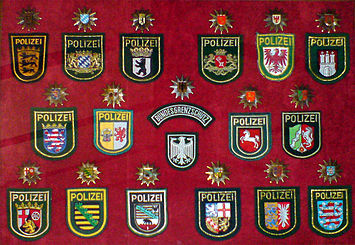Our website is made possible by displaying online advertisements to our visitors.
Please consider supporting us by disabling your ad blocker.
Law enforcement in Germany
This article needs additional citations for verification. (March 2008) |

Law enforcement in Germany is constitutionally vested solely with the states, which is one of the main features of the German political system.
Policing has always been a responsibility of the German states even after 1871 when the country was unified. The 1919 constitution of the Weimar Republic did provide for the possibility of creating a national police force, should the necessity arise, but it was only in the Nazi era that Gestapo (Secret State Police) were unified under central control and a national police force created (the Reich Security Main Office—Reichssicherheitshauptamt, or RSHA). The police became a tool of the centralized state and the Nazi party. Following the defeat of 1945, Germany was divided; in 1949 the three western zones were turned into the new West Germany, while the Soviet zone became East Germany. Each country pursued a different path concerning law enforcement.
In light of the gross misuse of power by the centralized Nazi state, the new West German constitution provided a strict separation of powers, placing law enforcement firmly in the hands of the states. The only policing agencies allowed at the federal level were the paramilitary Federal Border Guard (German: Bundesgrenzschutz), also responsible for coast guard services, and the Federal Criminal Police, both under the supervision of the Federal Ministry of the Interior. East Germany created a centralized police force under the Ministry of the Interior, the paramilitary Volkspolizei (literally "People's Police"). It also established a border police force (German: Grenztruppen der DDR), initially an independent force, later integrated into the army and then reorganized as an independent military organization. Because Germany's borders became largely open in 2005, due to the development of the European Union and spread of the Schengen Agreement to all neighbouring countries, the Bundesgrenzschutz was renamed to Federal Police (German: Bundespolizei). The duties of the Federal Police still are limited to the security of railway lines, main railway stations, airports, sea ports, and several other special duties.
Previous Page Next Page


